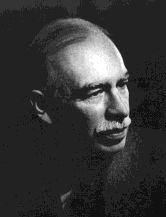
John Maynard Keynes (1936)
Written: 1935;
Source: The General Theory of Employment, Interest and Money by John Maynard Keynes, Fellow of the King's College, Cambridge, published by Harcourt, Brace and Company, and printed in the U.S.A. by the Polygraphic Company of America, New York;
First Published: Macmillan Cambridge University Press, for Royal Economic Society in 1936;
Transcribed for M.I.A., corrected and formatted by Andy Blunden;
This Edition: marxists.org 2002.
“Our criticism of the accepted classical theory of economics has consisted not so much in finding logical flaws in its analysis as in pointing out that its tacit assumptions are seldom or never satisfied, with the result that it cannot solve the economic problems of the actual world.” [Chapter 24]
Chapter 1: The General Theory
Chapter 2: The Postulates of the Classical Economics
Chapter 3: The Principle of Effective Demand
Chapter 4: The Choice of Units
Chapter 5. Expectation as Determining Output and Employment
Chapter 6. The Definition of Income, Saving and Investment
Appendix on User Cost
Chapter 7. The Meaning of Saving and Investment Further Considered
Chapter 8. The Propensity to Consume: I. The Objective Factors
Chapter 9. The Propensity to Consume: II. The Subjective Factors
Chapter 10. The Marginal Propensity to Consume and the Multiplier
Chapter 11. The Marginal Efficiency of Capital
Chapter 12. The State of Long-term Expectation
Chapter 13. The General Theory of the Rate of Interest
Chapter 14. The Classical Theory of the Rate of Interest
Appendix on the Rate of Interest in Marshall and Ricardo
Chapter 15. The Psychological and Business Incentives to Liquidity
Chapter 16. Sundry Observations on the Nature of Capital
Chapter 17. The Essential Properties of Interest and Money
Chapter 18. The General Theory of Employment Re-stated
Chapter 19. Changes in Money-Wages
Appendix on Prof. Pigou's Theory of Unemployment
Chapter 20. The Employment Function
Chapter 21. The Theory of Prices
Chapter 22. Notes on the Trade Cycle
Chapter 23. Notes on Merchantilism, the Usury Laws, Stamped Money and Theories of Under-consumption
Chapter 24: Concluding Notes on the Social Philosophy towards which the General Theory might Lead
“Whilst workers will usually resist a reduction of money-wages, it is not their practice to withdraw their labour whenever there is a rise in the price of wage-goods. It is sometimes said that it would be illogical for labour to resist a reduction of money-wages but not to resist a reduction of real wages. ... Moreover, the contention that the unemployment which characterises a depression is due to a refusal by labour to accept a reduction of money-wages is not clearly supported by the facts. [Chapter 2]